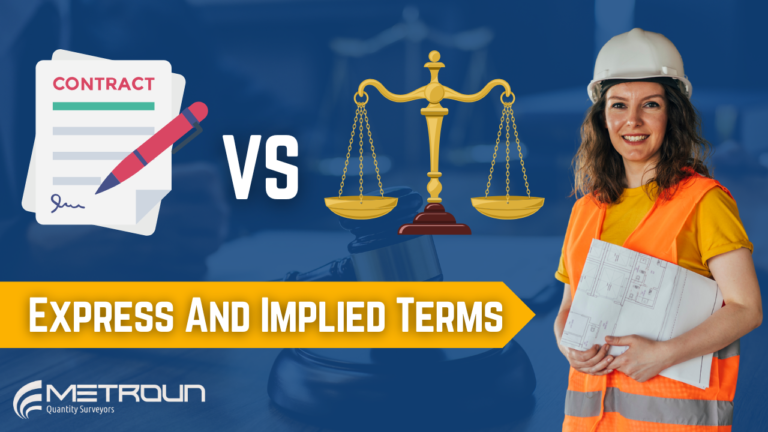In construction, contracts are the foundation of projects. They define scope, expectations, and responsibilities. But what happens when disputes arise, or a term isn’t explicitly stated? Understanding the difference between express terms and implied terms is essential. Whether managing costs, dealing with claims, or resolving disputes, knowing how these terms work can save time, money, and relationships. Let’s break it down.
________________________________________
What Are Express Terms?
Express terms are explicitly stated parts of a contract, agreed upon by all parties. These are typically written down, especially in construction, where clarity and legal backing are crucial.
Examples of express terms include:
- The scope of work to be delivered.
- The timeline for project completion.
- Payment schedules.
For instance, a contract might specify that a contractor must install 500 square metres of flooring within eight weeks. This clear, measurable statement is an express term. It leaves no ambiguity: the contractor knows what’s required, and the client knows what to expect.
Express terms provide certainty. Quantity Surveyors depend on them to calculate costs, manage timelines, and monitor performance. Without express terms, projects risk confusion and disputes.
________________________________________
So What Are Implied Terms?
Implied terms fill in gaps where express terms are silent. These are not written down but are included in the contract by:
- Law: For example, the Supply of Goods and Services Act 1982 (business contracts) and the Consumer Rights Act 2015 (consumer contracts) imply that services must be performed with reasonable care and skill. Similarly, the Sale of Goods Act 1979 requires goods to be of satisfactory quality and fit for purpose.
- Custom and Practice: Industry standards often imply terms if they are widely recognised in construction.
- And, necessity: Some terms are implied to ensure the contract is workable.
Using the flooring example, if the contract doesn’t specify material quality, implied terms ensure materials must be of satisfactory quality and fit for purpose. Implied terms act as a safety net, ensuring fairness and protecting parties from unreasonable outcomes.
________________________________________
Key Differences
Express terms are explicitly agreed upon, while implied terms are automatic. Generally, express terms take precedence unless they violate statutory protections or public policy.
For example, if a contract states materials are accepted “as-is,” implied protections for quality may be overridden. However, the Unfair Contract Terms Act 1977 ensures such clauses are fair and reasonable.
________________________________________
Introducing Metroun Learning
Metroun Learning is an online education platform, specific to Quantity Surveyors which can satisfy all your formal CPD needs. We offer over 45 hours of formal CPD, with new courses added each month. Although all courses amass to 45 hours of formal CPD, each individual course has been engineered so it can be completed during your lunch break. This can save you time, money & reduce your carbon footprint. Metroun Learning will not only satisfy your formal CPD needs, but you’ll also gain access to:
- The QS Dictionary
- Industry-Ready Templates
- Metroun AI
- And a variety of construction conversion calculators
To join Metroun Learning, simply click here










